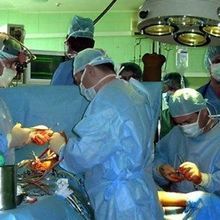Login
Subscribecircadian clocks, cell & molecular biology

Muscle Clocks Play a Role in Regulating Metabolism
Diana Kwon | Sep 1, 2018 | 9 min read
Just 20 years ago, scientists didn’t even realize muscles had their own circadian clocks. Now they are beginning to appreciate their importance in health.

Why Afternoon Open Heart Surgery Is Better for Patient Outcomes
Catherine Offord | Oct 27, 2017 | 2 min read
Research in human patients and mice reveals the role of the circadian clock in the risk of heart damage at different times of day.

Circadian Rhythms Influence Treatment Effects
Jyoti Madhusoodanan | Apr 1, 2017 | 10+ min read
Across many diseases, taking medication at specific times of day may make the therapy more effective.

Infographic: Circadian Clock Affects Health and Disease
Jyoti Madhusoodanan | Mar 31, 2017 | 1 min read
The body's rhythms could affect numerous ailments as well as how people respond to treatments.

Circadian-Controlled Thirst
Ruth Williams | Sep 28, 2016 | 3 min read
Scientists determine how the brain’s central clock regulates drinking prior to sleep in rodents.

Sugar Time
Catherine Offord | Mar 1, 2016 | 2 min read
Metabolic activity, not light, drives the circadian clock in cyanobacteria.

How Caffeine Affects the Body Clock
Ruth Williams | Sep 16, 2015 | 3 min read
Evening consumption of the drug leads human circadian rhythms to lag.

Triglyceride Clock
Abby Olena, PhD | Feb 10, 2014 | 2 min read
The timing of meals affects the levels of lipids in the livers of mice, according to a study.

Week in Review: January 20–24
Tracy Vence | Jan 23, 2014 | 3 min read
Mistimed sleep disrupts human transcriptome; canine tumor genome; de novo Drosophila genes; UVA light lowers blood pressure; aquatic microfauna fight frog-killing fungus

Out of Sync
Kerry Grens | Sep 1, 2013 | 10+ min read
Why eating at the wrong times is tied to such profound and negative effects on our bodies

Mind the Clock
Kerry Grens | Aug 31, 2013 | 1 min read
Many of the body's tissues can tell time, and these peripheral clocks can be influenced by environmental cues, such as the timing of food consumption.

Feeding Time
Kerry Grens | Feb 1, 2013 | 2 min read
The eating schedule—and not the amount of calories—can make the difference between an obese, diabetic, sick mouse and one with a healthy metabolism.
Sweet Smell of Success
Karen Hopkin | Jul 1, 2012 | 9 min read
With persistence and pluck, Leslie Vosshall managed to snatch insect odorant receptors from the jaws of experimental defeat.
Synchronized Clocks
Megan Scudellari | May 16, 2012 | 3 min read
Researchers identify the first circadian clock component conserved across all three domains of life.
Lab Studies Lie about the Clock
Megan Scudellari | Apr 4, 2012 | 3 min read
Fly circadian behavior is dramatically different in natural environments than in the lab.
How Skin Tells Time
Ruth Williams | Nov 9, 2011 | 3 min read
The behavior of skin stem cells is regulated by a 24-hour circadian clock.
Genetic Alarm Clock
Jef Akst | Oct 4, 2011 | 2 min read
Researchers identify a gene that wakes people up from sleep each day.
Circadian Signs of Aging
Kerry Grens | Jul 13, 2011 | 2 min read
The neural nexus of the circadian clock shows signs of functional decline as mice age, providing clues as to why sleep patterns tend to change as people grow older.
Time and Temperature
Richard P. Grant | Feb 1, 2011 | 2 min read
Editor's choice in physiology
